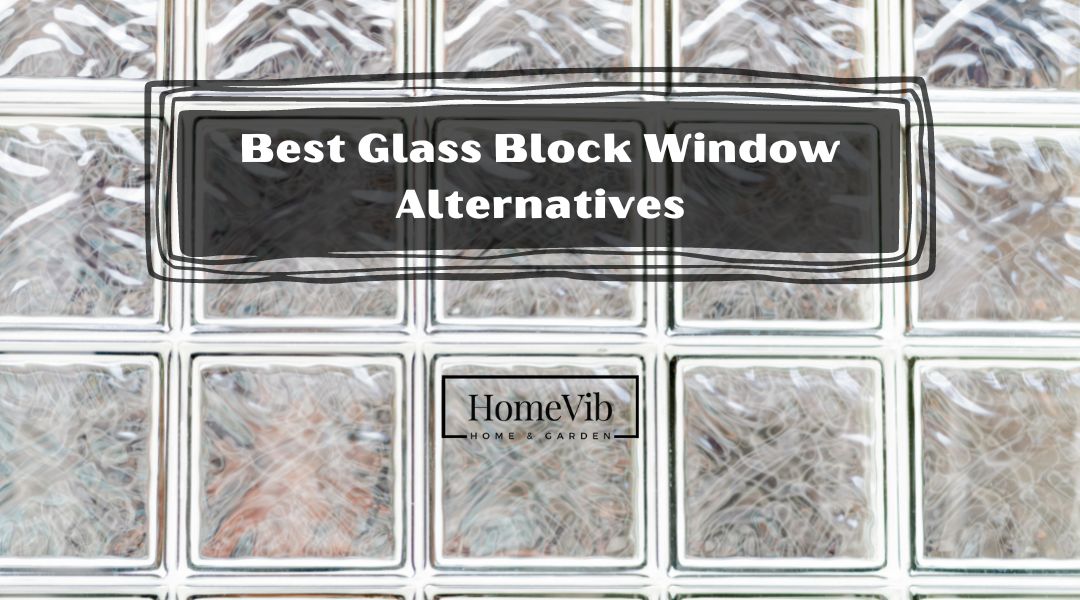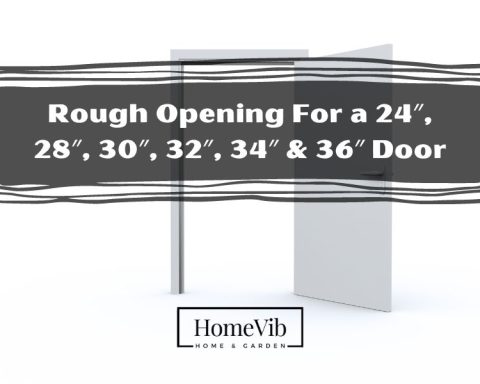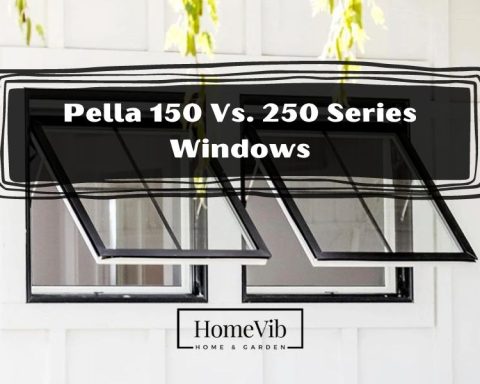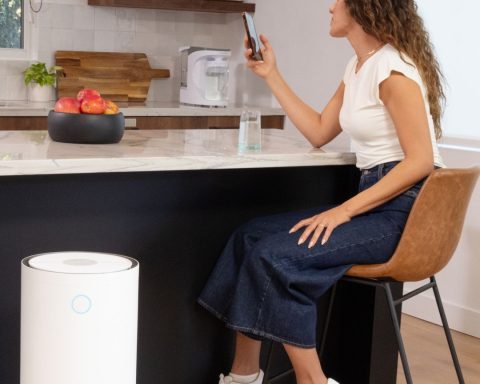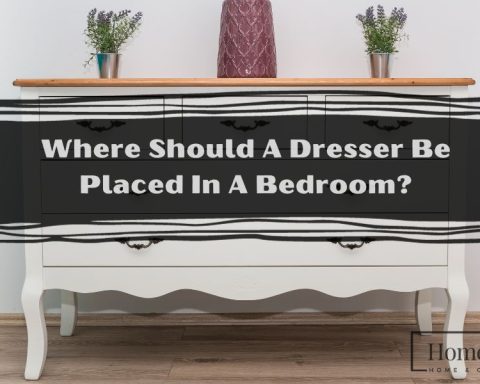Having the right window can transform your home’s exterior. A well-crafted glass block window can provide you with added privacy, style, and safety. But there are many options other than this. If you decide to install them, you must know all their features, benefits, and drawbacks.
The following are some of the best glass block windows alternatives. These are all available on the market today.
You can have six options when selecting an alternative for your glass block window. These are the main choices to consider:
- Vinyl Windows
- Wooden Windows
- Fiberglass Windows
- Aluminum Windows
- Acrylic Windows
- Thermal Pane Windows
What Is a Glass Block Window?

Glass block windows are often set in a grid pattern and consist of small square panes of glass.
If both privacy and security are essential to you, they are some of the top choices.
The benefits of glass block windows are like those of thermal pane windows. Most of the time, they seal the walls with mortar, so air can’t get out. This makes it easier to control the temperature. Thus, making it an effective moisture barrier. It also makes it harder for noise and dust to get in, which can greatly cut your energy costs.
Also, UV rays don’t hurt glasses in any way. As a result, it has a long service life and can continue doing its job for centuries. The main issue is that many pieces of window glass do contain lead and are thus not recycled.
Unfortunately, glass only has one major flaw—its fragility. But, compared to plastic, it excels in almost every way.
The 6 Best Alternatives to Glass Block Windows
The best alternative for your glass block window is the top six choices below:
- Vinyl Windows
- Wooden Windows
- Fiberglass Windows
- Aluminum Windows
- Acrylic Windows
- Thermal Pane Windows
Let’s go over each one separately, highlighting their advantages and disadvantages.
1. Vinyl Windows – One of the Most Popular
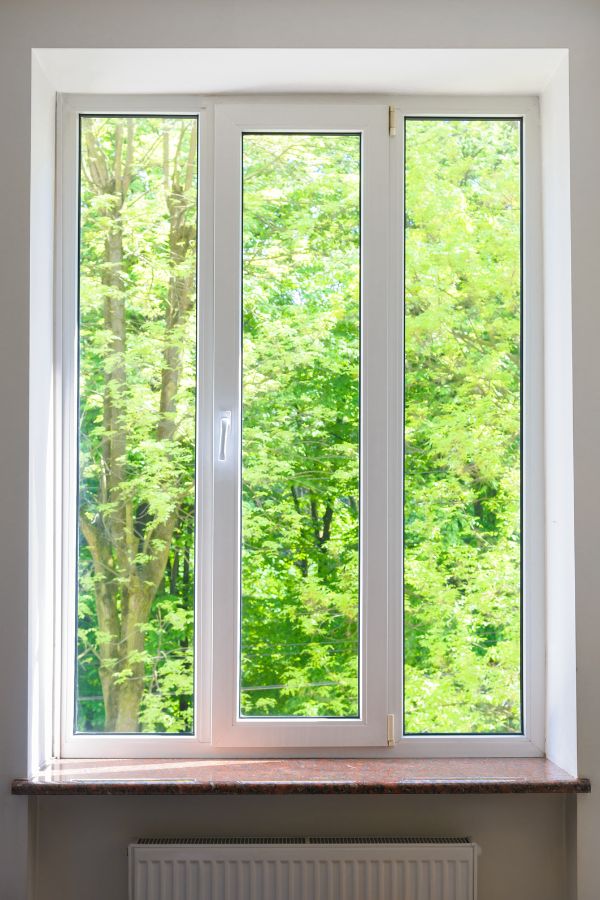
With its low price, vinyl became a popular substitute for more expensive materials.
Windows made of vinyl are glass panes set in a plastic (or steel-reinforced plastic) frame. Regarding thermal efficiency, they are light years ahead of aluminum. Windows made of vinyl are inexpensive to install and maintain.
Also, it brings great quality. They’re low-maintenance since you never have to paint or refinish them. It has several chambers, improving insulation and making the window sturdy.
Pros
- Window replacement with vinyl is more affordable than with wood.
- Vinyl’s low cost made it a popular alternative to more expensive materials.
- You can also customize it to look like other materials.
- It’s easy to clean and lasts a long time.
- The material is lightweight, flexible, and resistant to cracking or shattering.
- The process of installation is quick and simple.
Cons
- Some of their drawbacks are their short lifespan.
- And prolonged exposure to sunlight causes warping.
- It can be easily damaged by a scratch or a puncture, gathers dust, fades in the sun, and becomes see-through with time.
- Vinyl window and trim painting are more difficult than you might think. But it can be more work if you take your time and plan.
2. Wooden Windows – Excellent Replacement
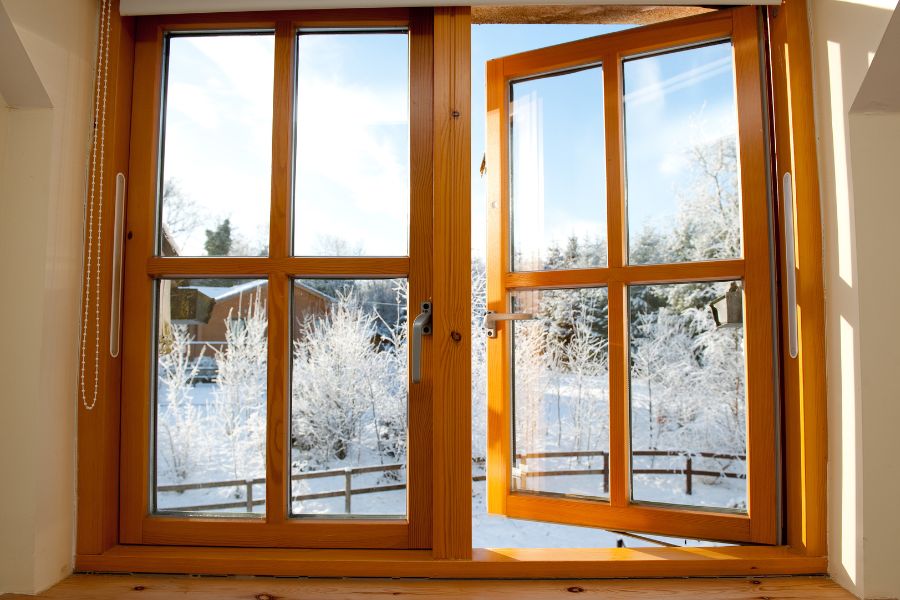
Wood Windows are still the excellent replacement type of windows available.
In particular, every firm provides composite or aluminum cladding exteriors. So if you’re looking for windows, go no further than wood ones.
Wood windows are the best choice if you want to redecorate the color of your windows. The wood windows are sturdy since they will last much longer than vinyl ones.
Pros
- One advantage of wooden windows is that they allow air circulation.
- It allows excess moisture to evaporate from the home, lowering the chance of mold growth.
- Wooden sashes don’t have rubber seals around the edges and don’t fit as snugly within the frame.
- Woods let in cold air compared to their non-wooden counterparts.
- A well-installed wooden window will last for many years.
Cons
- Wood windows need a lot of upkeep.
- It is vulnerable to the effects of environmental factors. These include temperature, humidity, and pollution.
- Heat and moisture increase wood’s susceptibility to decay.
- It can also cause termite infestation and cracking or warping.
- A spike in heating and cooling costs may result from wood damage.
3. Fiberglass Windows – Versatile Option
Fiberglass windows are your versatile option since they are eight times stronger material.
These are unbreakable glass fibers woven into the frames. Fiberglass windows, if well-maintained, can survive for 50 years or more. It often has a longer lifespan than wood.
And it is resistant to degradation caused by moisture or insects. Yet, fiberglass is the most durable material available.
Pros
- Fiberglass can withstand environmental elements better.
- Requires lesser maintenance thanks to its strength, durability, and water resistance.
- Can withstand long periods of exposure to harsh weather conditions without warping.
- Fiberglass saves you money on your utility bills. It’s a decent insulator and helps prevent too much heat or cold from escaping through the windows.
- Compared to wood, it lessens the need to use as much power.
Cons
- Expensive compared to vinyl alternatives.
- The strength and longevity of fiberglass do come at a higher cost.
- Compared to wood windows, you can’t paint them any color you like.
- Windows made of fiberglass are less likely to expand and contract over time.
- Leaks can occur in fiberglass sash and frames.
4. Aluminum Windows – Industrial Style
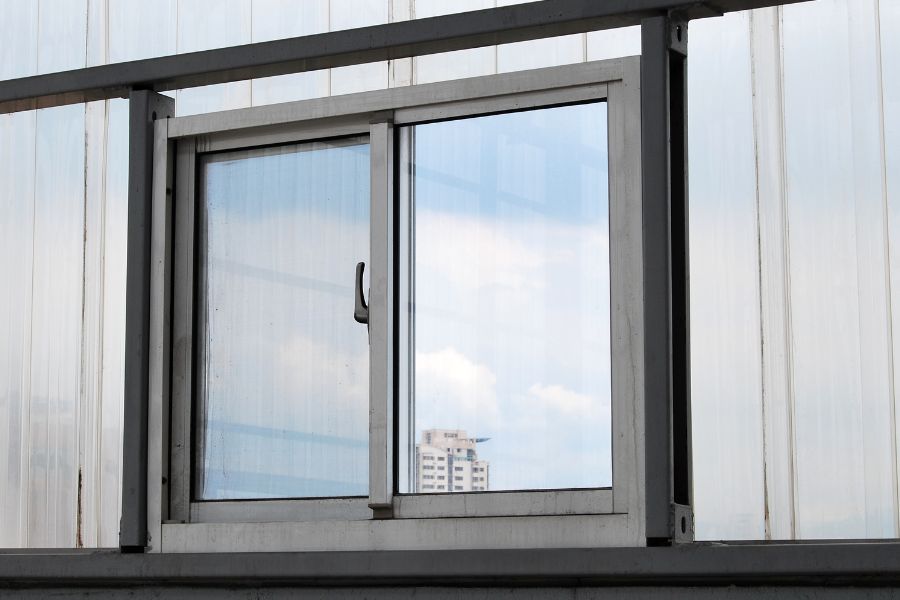
If you’re looking for more alternatives, aluminum windows with an industrial style are a way to go.
One of the most environmentally friendly products available is aluminum windows. People use aluminum since it is the benchmark material for sustainable building.
Aluminum is the metal choice for architects due to its durability and unique look and feel. Thus, making it a classic material.
They are the standard because they combine aesthetic appeal. It comes with strength, security, longevity, and cost-effectiveness.
Pros
- Very high quality.
- Aluminum’s high thermal conductivity makes it one of the most energy-efficient materials.
- It is great for homeowners who want to reduce their carbon footprint and utility costs.
- You can customize aluminum casement windows that can work with various locking systems.
- Aluminum windows are recyclable and safe for the planet.
- You can recycle it without degrading the metal’s purity.
Cons
- Unlike other materials, aluminum is a poor insulator and loses heat quickly.
- They are susceptible to the formation of condensation and frost on the inside.
- Resistant to most liquids, they are vulnerable to corrosion in the presence of salt water and sea air.
5. Acrylic Windows
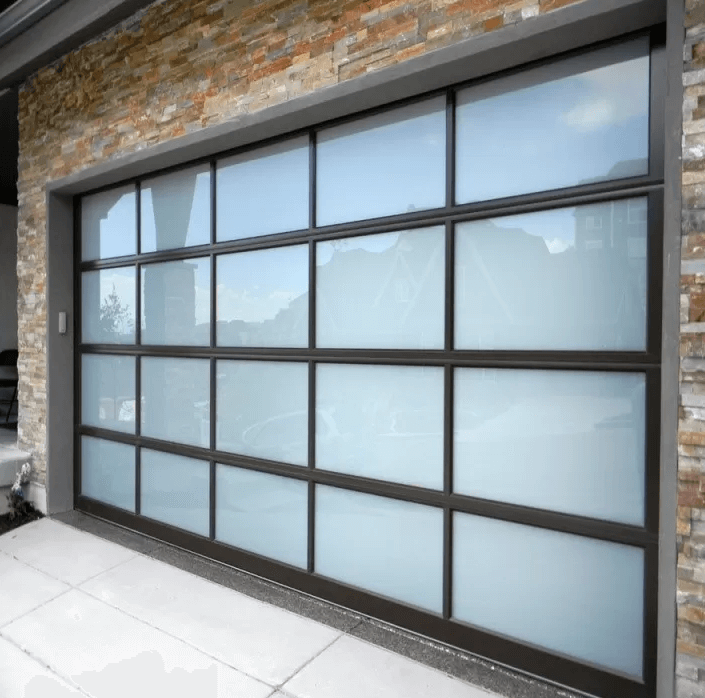
Acrylic glass, or poly(methyl methacrylate), goes by the Plexiglas brand name. Windows made of acrylic are simple to modify, set up, and use. Also, compared to glass, they are much more durable.
The lightweight and break-resistant nature of these make them a glass substitute. The same substance has several applications, like casting resin in inks and coatings. When acrylic windows are custom-made, they can withstand significant forces.
Pros
- Normal thicknesses of the material have the advantage of being visually flat.
- Polycarbonate has high strength and surface hardness.
- It is resistant to pushing and bending and susceptible to impact damage.
- Durability, transparency, resistance to ultraviolet radiation, and suitability for specific uses.
- It has particular brands to choose from.
Cons
- Exceptionally lightweight but also very scratchable.
- Very transparent, although it gradually turns yellow and hazy when exposed to light.
- High heat or direct flames might cause it to melt.
- The process of making acrylic products can release hazardous fumes.
- You can recycle acrylic can, but it doesn’t biodegrade in the process.
6. Thermal Pane Windows
Thermal Pane Windows release the air and replace it with argon, krypton, or xenon.
In comparison, thermal windows can increase efficiency by as much as fourfold. Because of this, you may expect to see a return on investment. It is between 20-30% in the form of reduced heating costs throughout the winter.
When in good shape, they provide excellent insulation. If your thermopane windows break, they will suffer in terms of efficiency.
Pros
- You should expect improved thermal efficiency against heat and cold.
- Reduced outside-to-inside noise levels.
- Improves a building’s ability to conserve energy. With less heat escaping, less electricity is necessary to heat or cool the room.
- This reduces the need for artificial lighting and other electrical appliances.
- The two panes of glass prevent noise from traveling through.
- Serves as a buffer between the interior and the exterior homes.
Cons
- Insulated glass has the drawback of being quite costly to install.
- The unit must be meticulously sealed with silicone for the insulated glass panes.
- Condensation and eventual damage to the glass unit could ensue from any leakage.
- You should replace the entire window since you cannot replace glasses.
Are Glass Blocks Cheaper Than Windows?
Glass block windows can be expensive because they are heavy. Also, the manufacturing process is costly.
But they are more resilient and effective at insulating than standard windowpanes. This is because of their increased thickness. Some homeowners use them to let in natural light while maintaining privacy.
Costs
Glass block windows often have a slightly higher price tag than single-pane windows. Depending on the specifics of your situation, you could spend between $500 and $1,000. That would include expert installation. However, prices will change based on the scope of the project and your location.
Benefits
- Glass block windows are a great security measure. But you can also use them for aesthetic purposes. The density and solidity of their construction make allies impossible to break into.
- Glass blocks provide superior insulation to standard single-pane windows. This makes them a good choice for the winter months. This way, less of the heated air from your home or office will escape. It will keep the space inside warmer for longer.
- It omits energy efficiency. Glass block windows are on a level with thermal pane windows. Most of the time, it comes with mortar, making air leaks impossible.
- You can also install vents in these windows to let fresh air in. The upkeep of a home’s windows can be labor-intensive. Glass-block windows need almost no maintenance.
Drawbacks
- Due to its high cost, this material requires special attention. You need to clean consistently. It can be challenging to do exterior cleaning and upkeep on high-rise buildings.
- Unlike vinyl, which can be easily opened for ventilation, you cannot open it from the outside.
- Glass block units are bulky and fragile. Like mirrors and other types of glass, they are fragile and prone to breakage.
- The entire structure could be unsafe if a glass block window develops chips and cracks.
How To Pick the Best Glass Block Windows Alternative?
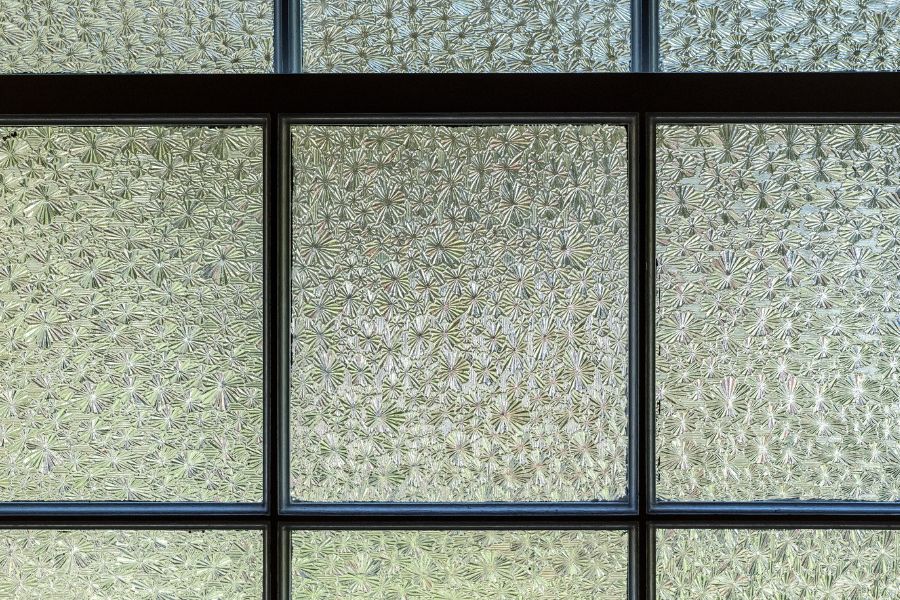
To pick the best glass block windows alternative, select the best material.
Glass, often known as glazing, is a crucial component of any window. The cost, resources, heating, and cooling options, will all play a role. It will help if you consider the house’s areas and functions too. As well as its connections to its environment, climate, and neighbors.
You could look for these qualities when purchasing the choice for your window:
- Cheap
- Stronger
- Safer
- Easier to Use
- Better Light Transmission
- More Special Qualities
If you’re installing new windows, you should get ones made of durable glass. Not only does it keep the sun at bay and the temperature stable, but it also keeps your privacy intact. To improve the visual appeal of your home, you should install vinyl glass windows.
Installing vinyl on your current windows is a less expensive alternative. Another option is to cover the windows permanently with shades, drapes, or shutters.
When it comes to your home, you should be able to design it in whatever you choose. Consider the six options above if you want the glass block windows to look.
If you want to maximize the amount of natural light in your home, choose aluminum windows. It’s important to select windows that are well-suited to your climate. If you live in a humid climate, fiberglass windows are the best option. This also provides durability to withstand bad weather.
If you want long-lasting windows, wood ones are your best bet. This is best if you live where winters are freezing, and summers are scorching hot.
Generally, people’s preferences and requirements vary. Hence various window types are available.

